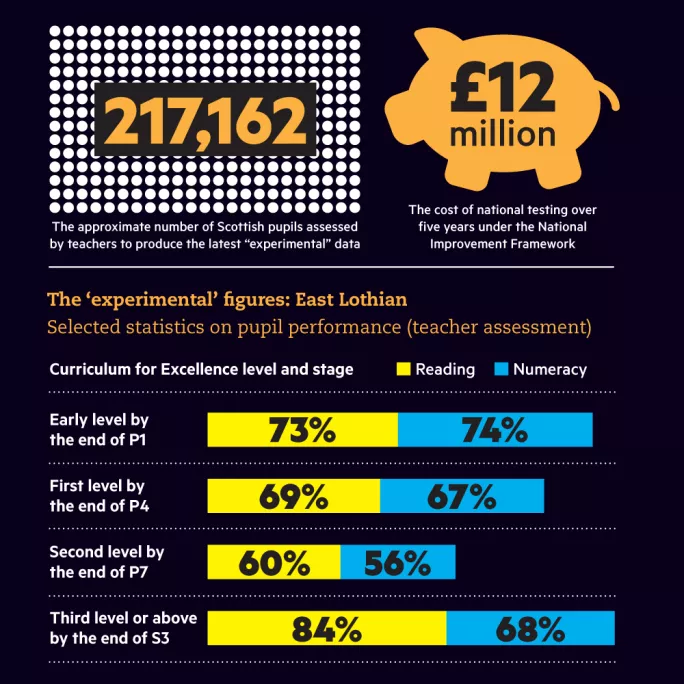‘Experimental’ data risks unfair verdict on schools

“Experimental” pupil performance data, due to be published by the Scottish government, will be neither robust nor reliable - and could be used to judge schools unfairly, councils have warned.
The information about pupil progress in primary and S3 could lead to schools and local authorities being wrongly branded as performing poorly because parents, the general public and the media will take the figures seriously, local authorities claim.
John Stodter, general secretary of education directors’ body ADES, said that the figures on the literacy and numeracy of pupils in P1, P4, P7 and S3 were flawed and that it was too early to use them to make judgements about schools or authorities.
The data, based only on teacher assessments, will be published this month as a prelude to the results of the standardised tests that will form the heart of the new National Improvement Framework in two years’ time. Under the NIF, the government wants to get a clearer picture of pupil performance across the education system, in a bid to work out how to close the attainment gap.
But Mr Stodter said it was wrong to publish what the government was calling “experimental statistics” based on teacher judgements.
“There are issues about the reliability and robustness of this information and also the consistency across councils,” he said. “But the media will make judgements and may label local authorities or schools in a particular way based on this information, and that would be unfair.
“This information will be taken very seriously when it is released - when it’s out there, it’s out there. But there is concern that people will treat this information as an assessment of the system, of schools and of local authorities, and make judgements when it is really too early to do so.”
‘Handle with caution’
Shamin Akhtar, education and children’s services spokesperson for East Lothian Council, said that the published figures needed to be treated with “great caution”. They were “by no means robust statistics” and were “very much dependent on subjective judgements”, he added.
East Lothian’s results were among the first to be made public when they were submitted to local councillors last month (see graphic, above). “They certainly don’t provide a full picture of what’s happening in our schools,” Mr Akhtar said.
Councils have also pointed out that the teacher judgements about pupil progress had to be submitted to the Scottish government by August - before the literacy and numeracy benchmarks were published.
In addition, standardised assessments - which teachers will use to help inform their judgements about whether a child is working at the right level for their age and stage - are not due to be introduced in Scotland until August next year.
Councils have warned that a lack of moderation will mean that results vary between authorities.

One headteacher, meanwhile, told TESS that even teachers within the same school could disagree when it came to judging whether or not a child had achieved a certain level.
Robert Hair, head of Kinloss Primary School in Moray, added that teachers were likely to have underestimated the number of pupils who had achieved the right level for their age and stage.
Mr Hair, who is also president of primary school leaders’ body the AHDS, said: “Teachers will err on the side of caution because it was very short notice when we got this request and they will not have had the chance to triangulate the evidence.”
The new statistics will come with a health warning, the Scottish government told TESS. They will be labelled “experimental statistics - data under development” to reflect “the developing nature of the information”, a spokesman said.
“Publishing this data was a commitment in the education delivery plan,” he added. “It will enable a more detailed understanding for parents of the progress young people are making within Curriculum for Excellence, based on the judgement of their teachers.”
You need a Tes subscription to read this article
Subscribe now to read this article and get other subscriber-only content:
- Unlimited access to all Tes magazine content
- Exclusive subscriber-only stories
- Award-winning email newsletters
Already a subscriber? Log in
You need a subscription to read this article
Subscribe now to read this article and get other subscriber-only content, including:
- Unlimited access to all Tes magazine content
- Exclusive subscriber-only stories
- Award-winning email newsletters